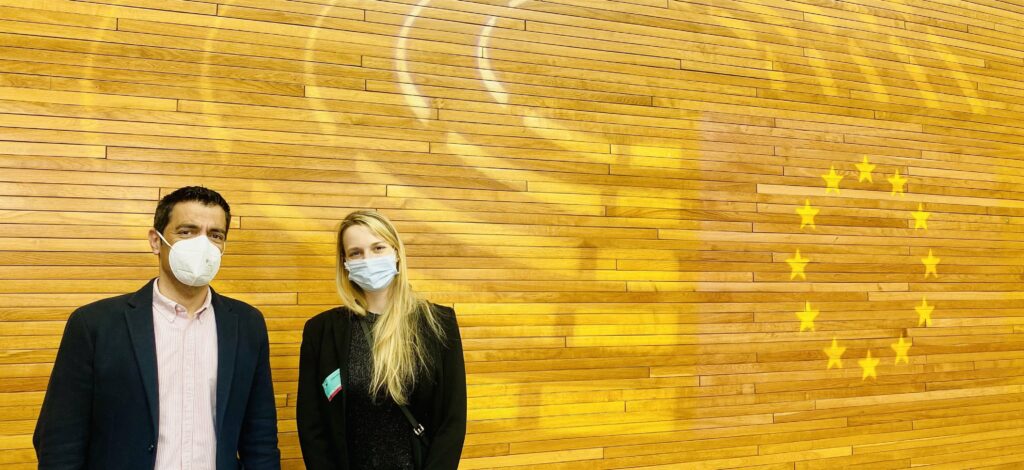Strasbourg, France, 7-9 March 2022 – As part of its continuous work of advocacy with the European institutions, Efus met with various members of the Congress of Local and Regional Authorities of the Council of Europe and of the European Parliament in Strasbourg (FR), on 7-9 March.
Indeed, in light of the ever evolving challenges that local and regional authorities face, it is increasingly important that they gain support from the European institutions for preventing and mitigating urban security related threats, enhancing social cohesion and providing security for all citizens.
Efus exchanged with the Director of the Congress of Local and Regional Authorities, Rafael Benitez, and with Members of the European Parliament (MEPs) Jan Olbrycht, Sandor Ronai and Marcos Ros Sempere. This exchange was also an opportunity for Efus to present projects, actions and initiatives of common interest, such as the EU-co-funded SHINE project.
Prevention of polarisation and hate speech
Founded under the auspices of the Council of Europe, Efus has always closely cooperated with this European instance, and more specifically with the Congress of Local and Regional Authorities of the Council, which is “responsible for strengthening local and regional democracy in its 46 member states and assessing the application of the European Charter of Local Self-Government.” Its Governance Committee “is responsible for legal and political issues relating to the effective development of good governance and democracy at local and regional levels” and its Current Affairs Committee is responsible for exploring the role of local and regional authorities with regard to the major challenges of our society and preparing work on thematic issues such as social cohesion, education, intercultural and interreligious dialogue, youth participation, integration of migrants, protection of children, and gender equality.
Efus and these two committees foresee to further dialogue, cooperate and exchange promising practices on a range of topics of common interest, such as the strengthening of social cohesion and the prevention of polarisation at the local level, the prevention and mitigation of hate speech, youth engagement, the protection of the rule of law and fundamental rights, the prevention of sexual harassment, and the security of local elected officials.
Solidarity between European cities and direct EU support
In light of the Ukrainian refugee crisis, technical and financial support from the EU to European cities and regions that are currently organising and operationalising humanitarian support is crucial. Indeed, towns and cities, in particular but not exclusively those close to the Ukrainian border, are directly involved in welcoming refugees and organising accommodation, medical and social welfare and other types of support, but they need EU-level help to be able to cope.
The President of the URBAN Intergroup of the European Parliament, Jan Olbrycht, highlighted the need for such multilevel cooperation and commended Efus’ role in providing a platform for exchange and dialogue between peer local and regional authorities and the different levels of governance.
MEP Sandor Ronai also highlighted Efus’ key role as a network that can bring the EU closer to local and regional authorities and support them in the design and implementation of their urban security policies. He added that direct financial support from the EU to European cities and regions is essential.

The EU’s New European Bauhaus initiative
Named after the famous architectural and art movement of the 1920s in Germany, the New European Bauhaus initiative is a holistic and interdisciplinary approach that seeks to support the green transition in our economy and society and help fight climate change by creating sustainable, beautiful and inclusive places and ways of living that are accessible and affordable for all. According to the EU, “the New European Bauhaus initiative calls on all of us to imagine and build together a sustainable and inclusive future that is beautiful for our eyes, minds, and souls.”
Efus met with MEP Marcos Ros Sempere, who recently launched the European Bauhaus’ Friendship Group at the European Parliament. He stressed that local and regional authorities will have the possibility through this initiative to establish cross-cutting projects for creating liveable and inclusive urban spaces, which enhance citizens’ feeling of security. Indeed, the approach promotes urban environments in which crime prevention, sustainability and inclusiveness are embedded.
Efus closely follows this initiative and will inform its members about its practical operationalisation.






